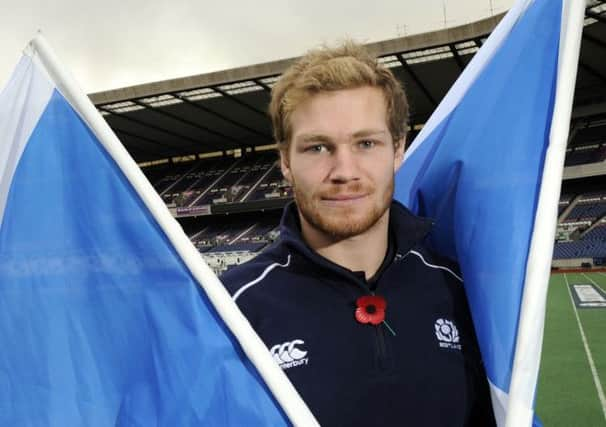Allan Massie: Sad to see Ross Rennie retire


If Rennie, a natural openside, had recovered from the injury that has ended his career, he would have found himself competing against Blair Cowan, John Barclay, Chris Fusaro and perhaps Roddy Grant.
Still, he might have got to the head of the queue again, despite playing his club rugby in the English second division, for, at his best, Rennie was special. Wonderfully adept at winning the ball on the floor or ripping it from the ball-carrier’s clutches, his reading of the game was exceptional. Any team-mate making a break was likely to find him on his shoulder.
Advertisement
Hide AdAdvertisement
Hide AdIt was a surprise when Alan Solomons decided last season that Rennie was surplus to requirements at Edinburgh, but no surprise that Bristol’s coach, Andy Robinson, who had selected him for Scotland, should have snapped him up. After all, two or three years ago, John Rutherford opined that Rennie was the best all-round rugby player in Scotland.
Of course, it is inevitable that, in a contact-sport, a fair number of careers are ended prematurely. Rutherford himself might have had a couple more years at the top but for an injury to his anterior cruciate ligament, an injury which is now more easily repaired than was possible back in 1987. Johnnie Beattie is one who has returned to international rugby after suffering cruciate damage, and Ruaridh Jackson is another now on his way back to fitness after tearing that wretched thing in the autumn.
So now Ross Rennie has been forced on to the sidelines, along with Thom Evans, Rory Lamont and Joe Ansbro, all of whom played with him for Scotland, and were forced out of the game in their 20s.
We are now coming to what may be called the business part of the season, with a couple of rounds of European competition before the Six Nations kicks off, a time for close scrutiny of medical bulletins. Glasgow are going to have to play remarkably well if they are to get through to the quarter-finals of the Champions Cup. Their failure to take a losing bonus point from their away match against Toulouse may cost them dear, for it’s recognised that they probably need nine points from their home match against Montpellier and away one against Bath. This is a tough prospect, especially since Glasgow will be without Rob Harley and Chris Fusaro in the all-important back-row. You are unlikely to score the four tries required for a bonus point if you don’t regularly win quick ball, and that is hard enough to do even with your best back-row on the field. It’s just possible that 18 points may be enough to get one of the three places reserved for the best runners-up in the pools, but it is unlikely.
Edinburgh have, as expected or at least hoped, benefited from being downgraded to the Challenge Cup. Four wins mean they are on the verge of qualifying and with a chance of a home quarter-final. They have been improving steadily, partly with the return of injured players, partly perhaps because, in the last couple of weeks, they have been able to field a starting XV with more Scots and Scottish-qualified players.
Looking ahead to the Six Nations is a rather futile exercise until we know who will be fit. This is, of course, the same with everyone. England have now lost Ben Morgan for the whole tournament and Manu Tuilaigi is still absent. There will doubtless be other absentees after two rounds of European matches. Coaches everywhere will be keeping their fingers crossed.
Meanwhile, the announcement of France’s preliminary 31-man squad is of special interest to us, given that we go to Paris for our first match. We have grown accustomed over the years to the vagaries of French selection and, in this respect, Philippe St-Andre maintains consistent form. Of course, he has almost an embarrassing array of riches to choose from. All the same, there are some strange omissions. Morgan Parra is missing, Sebastien Tillous-Borde and the South African-born Rory Kockett being preferred at scrum-half. I reckon that Parra ranks with Conor Murray as the best 9 in the northern hemisphere, and his absence is as surprising as it is, from a Scottish point of view, welcome. Other notable absentees are Thomas Domingo, Dimitri Szarzewski and the young Toulouse star Gael Fickou. Domingo’s absence may have Scotland’s prospective tightheads in two minds. Their immediate reaction may be “thank heavens”, before they start wondering if his replacement may be even more formidable in the scrum.
Of course, naming a preliminary squad this week is tempting providence. Most of its members will be playing in the Champions Cup this weekend and next and it will be surprising if a number of them don’t pick up knocks or injuries which will keep them out of the Scotland match three weeks today.
But that’s how it is. Results may often seem to be in the lap of the gods, but they are often unquestionably in the hands of the doctors.